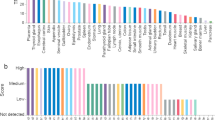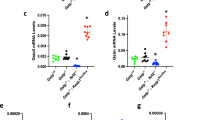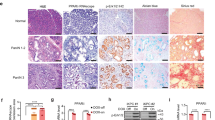Abstract
Peroxisome proliferator–activated receptor-δ (PPAR-δ; also known as PPAR-β) is expressed at high levels in colon tumors, but its contribution to colon cancer is unclear. We examined the role of PPAR-δ in colon carcinogenesis using PPAR-δ-deficient (Ppard−/− ) mice. In both the Min mutant and chemically induced mouse models, colon polyp formation was significantly greater in mice nullizygous for PPAR-δ. In contrast to previous reports suggesting that activation of PPAR-δ potentiates colon polyp formation, here we show that PPAR-δ attenuates colon carcinogenesis.
This is a preview of subscription content, access via your institution
Access options
Subscribe to this journal
Receive 12 print issues and online access
$209.00 per year
only $17.42 per issue
Buy this article
- Purchase on Springer Link
- Instant access to full article PDF
Prices may be subject to local taxes which are calculated during checkout

Similar content being viewed by others
References
He, T.C., Chan, T.A., Vogelstein, B. & Kinzler, K.W. Cell 99, 335–345 (1999).
Gupta, R.A. et al. Proc. Natl. Acad. Sci. USA 97, 13275–13280 (2000).
Park, B.H., Vogelstein, B. & Kinzler, K.W. Proc. Natl. Acad. Sci. USA 98, 2598–2603 (2001).
Barak, Y. et al. Proc. Natl. Acad. Sci. USA 99, 303–308 (2002).
Gupta, R.A. et al. Nat. Med. 10, 245–247 (2004).
Lefebvre, A.M. et al. Nat. Med. 4, 1053–1057 (1998).
Saez, E. et al. Nat. Med. 4, 1058–1061 (1998).
Niho, N. et al. Cancer Res. 63, 6090–6095 (2003).
Osawa, E. et al. Gastroenterology 124, 361–367 (2003).
Michalik, L., Desvergne, B. & Wahli, W. Nat. Rev. Cancer 4, 61–70 (2004).
Burstein, H.J. et al. Breast Cancer Res. Treat. 79, 391–397 (2003).
Kulke, M.H. et al. Cancer J. 8, 395–399 (2002).
Girnun, G.D. et al. Proc. Natl. Acad. Sci. USA 99, 13771–13776 (2002).
Peters, J.M. et al. Mol. Cell. Biol. 20, 5119–5128 (2000).
Su, L.K. et al. Science 256, 668–670 (1992).
Acknowledgements
Animal care and procedures were approved by the Institutional Animal Care and Use Committees at The Pennsylvania State University and National Cancer Institute. The authors thank A. Burns and R. Horner for technical assistance, and G. Perdew and A. Kusnadi for providing the COS-1 cell lysate. This work was supported by National Cancer Institute grants CA97999 and CA89607 (J.M.P.).
Author information
Authors and Affiliations
Corresponding author
Ethics declarations
Competing interests
The authors declare no competing financial interests.
Rights and permissions
About this article
Cite this article
Harman, F., Nicol, C., Marin, H. et al. Peroxisome proliferator–activated receptor-δ attenuates colon carcinogenesis. Nat Med 10, 481–483 (2004). https://doi.org/10.1038/nm1026
Received:
Accepted:
Published:
Issue Date:
DOI: https://doi.org/10.1038/nm1026
This article is cited by
-
Novel six-gene prognostic signature based on colon adenocarcinoma immune-related genes
BMC Bioinformatics (2022)
-
Unraveling the role of peroxisome proliferator-activated receptor-β/δ (PPARβ/δ) expression in colon carcinogenesis
npj Precision Oncology (2019)
-
ROS release by PPARβ/δ-null fibroblasts reduces tumor load through epithelial antioxidant response
Oncogene (2018)
-
Genetic-deletion of Cyclooxygenase-2 Downstream Prostacyclin Synthase Suppresses Inflammatory Reactions but Facilitates Carcinogenesis, unlike Deletion of Microsomal Prostaglandin E Synthase-1
Scientific Reports (2015)
-
Brain metabolite clearance: impact on Alzheimer’s disease
Metabolic Brain Disease (2014)



